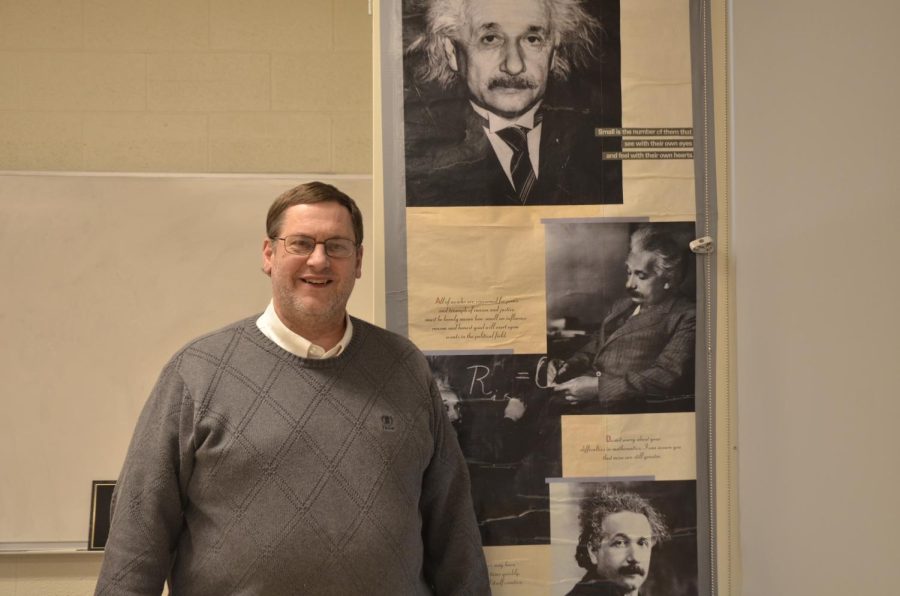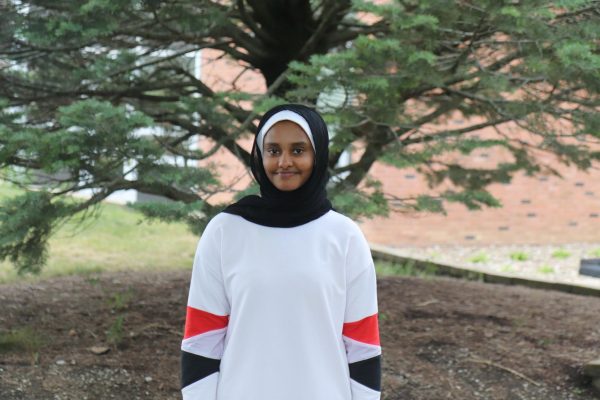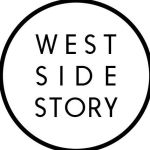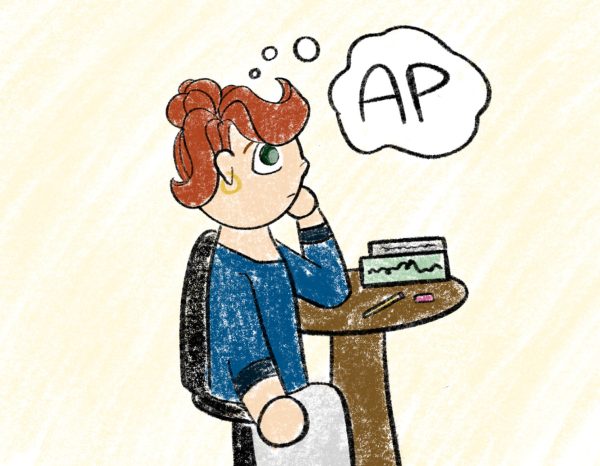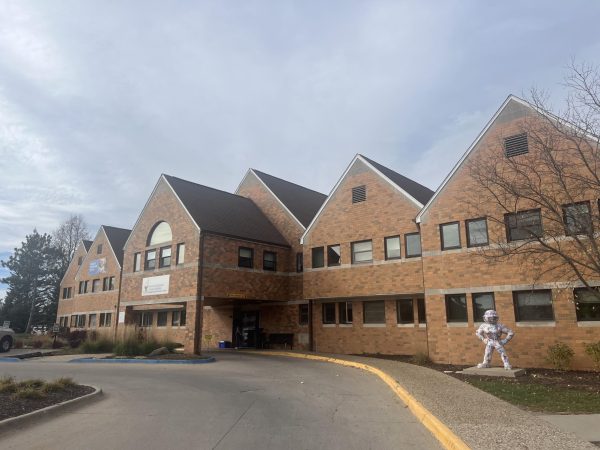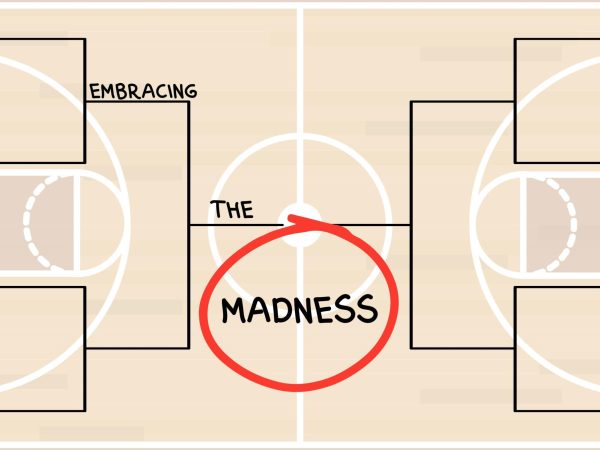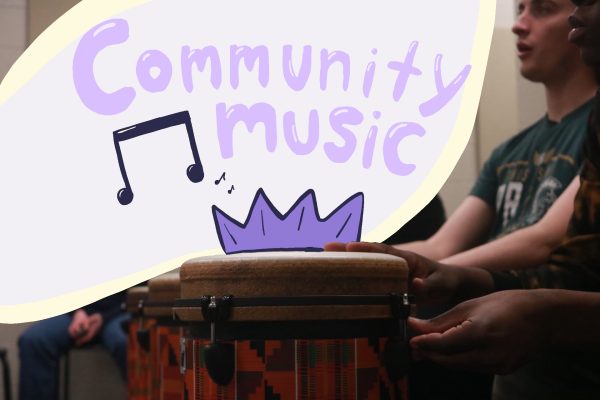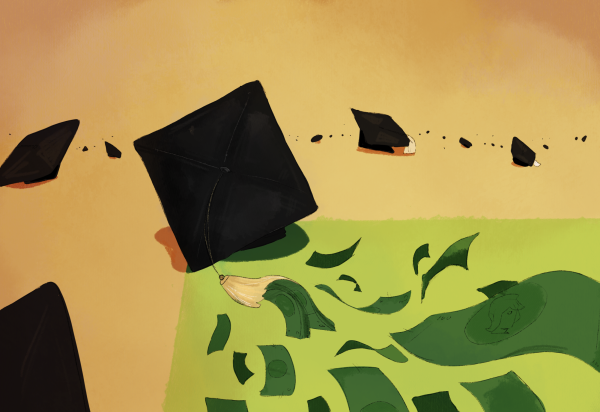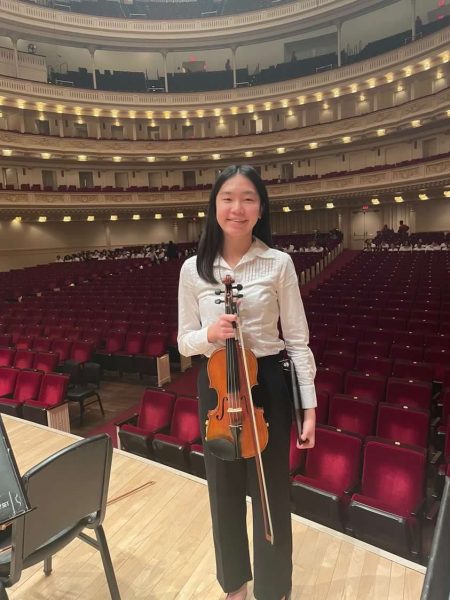Kirpes with a mathematical purpose: Q and A with Math Club Coach James Kirpes
Math Club Coach and West High mathematics teacher James Kirpes sits down for a classic Q&A with West Side Story.
James Kirpes stands by a poster of Albert Einstein. His favorite quote by Einstein is, “Do not worry about your difficulties in Mathematics. I can assure you mine are still greater.”
April 26, 2023
Did your saying “Mr. Kirpes with a mathematical purpose” come from anywhere in particular?
It does. So I was in about fourth grade, and my oldest sister, Martha, was running for a county 4-H office. She made posters that said Kirpes with a purpose. And that really struck me. I was like, “What a great campaign slogan!” Y’know, one, everyone knows how to say your name. And two, you want to like somebody with a purpose, right? So I just had that tucked into the deep recesses of my brain. And when I became actually a student teacher in Kansas City, my brain was like, “Hey, let’s do with a mathematical purpose.” And there it is, right there. I stole a good idea from my sister.
When did your very punny sense of humor start?
Through grade school, through junior high, in my mind, I was not a funny person, a comic, who had that sense of humor. I think it was really only until I got to high school that I saw I could use humor as a way to connect with people. And so when I realized that I could connect positively with people using humor, I was like, “Whoa, what a great idea!” Right? That’s a good thing. So I’ve done my best to embrace it. Since then, I’ve always enjoyed wordplay, whether you call it puns or other stuff, just forming relationships with people.
Why did you decide to be a teacher? How did that go?
Yep. So when I was a junior in high school. I knew two things. Because of course, teenagers know everything, right? And the two things that I knew is, one, I wanted to study math in college, check. And two, I wasn’t going to teach math. And the reason I knew that is that I was involved in math club. And I remember one day I was trying to explain a math idea. And I apparently just bungled it and did a horrible job. And my peers said, “You can’t teach anything.” And so my brain just kind of consciously crossed out math teacher from that remark.
Now, fast forward to Iowa State, two years later, I was studying math and sociology. I have a double degree, a BS, from Iowa State. I got a BS in math and a BA in sociology.
Like a lot of college freshmen, I didn’t have a lot of pocket money. And so I asked myself, what am I good at? Or what skills do I have, and I’m like I’m pretty good at math. So I went to the University tutoring office because they were looking for math tutors. And second semester, I started tutoring. And I felt like I was pretty good at it, and I definitely enjoyed it.
Actually, I should interject before I get too far ahead. In my senior year in high school, I had an open hour. You could basically call it peer tutoring. But during your open hour, instead of being in a study hall, you could go to a math teacher’s room and help out somebody who wanted help in math, and I did that as a senior. It’s like “This is kind of fun. I get to explain math to someone!”
So I became a tutor at Iowa State. After one semester, I realized that instead of the university taking 12 dollars an hour per session from students and giving me six I could just make the whole 12 myself. So I became an independent tutor for the remaining time at Iowa State. And that led me to teacher education and led me to be a math teacher.
Why teach math specifically?
So, I love mathematics. When I was in first, and second grade, I just love to count things, just, I was just enamored with counting things, I remember. As I told you, I have a degree in sociology. I had no interest in teaching social studies.
So for me, it really wasn’t even a question. Math is just something I’ve always enjoyed and had a passion for. So why not help other people? That’s the sociology connection. And sociology, I was interested in helping others with perspective. Teaching was a natural blend of math and helping others.
And one of the things I’ve really discovered about me, let me go back to my freshman year at Iowa State.
I did a mentoring program with a math professor. And that’s when I realized I did not have the interest or the ability to be a professional mathematician, say, an academic, and get a Ph.D. And that was really important for me because it can be just as helpful to know what you don’t want to do as what you do want to do. So after I crossed off professional mathematician, that helped me to think more about the teaching aspect of things, you know, and we kind of consider other avenues.
How many years have you taught?
I have taught in public schools for 31 years, and 25 glorious years at West. And I say public schools because summer after my freshman year at Iowa State. I tutored as a senior in high school; I tutored as a freshman at Iowa State. And then my summer after my freshman year, I started with CY-TAG (Challenges for Youth Talented and Gifted) under OPPTAG (Office of Precollegiate Programs for Talented and Gifted) at Iowa State. They started CY-TAG the summer after my freshman year. And so I was one of the original people in the program. And so I was actually a math instructor during the summer. I would teach Saturday math classes every other Saturday during the school year. So, by most people’s standards, I’ve been teaching 31 years, but I’ve actually been tutoring math, five years before that.
You’ve said you’ve student taught someplace before moving back to Iowa? How was that?
I student taught in Kansas City for my 10th and final semester at Iowa State. So I was on the five-year plan because I got two bachelor’s degrees, a minor in statistics and a teaching certification. So I had a busy five years.
But I had nine academic semesters that I was in-state. And then my 10th and final semester, by choice, I was involved in a program. Here’s another acronym. I was in the CUTE program, which stands for the Cooperative Urban Teacher Education. And when I heard about the CUTE program, it immediately caught my attention. Because as you can guess it was a great combination of the mathematical and the sociological sides of me.
So I student taught at FL Schlagle High School in Kansas City, Kansas, by choice. This is known as an urban or inner-city high school. So it has its share of challenges. I’ve never worked harder in my life. And it was an experience I absolutely loved. Amazing, awesome experience. In my four months there, I grew up four years.
How exactly did that experience affect you?
I left there feeling I could teach anywhere in the United States, and maybe even anywhere in the world. Because it was such an overall encompassing experience. In other words, you just didn’t go to school, teach, and go back home. You learned about the neighborhoods, and the city, and the students.
So we worked at immigrant and refugee centers helping clients learn English, we tutored struggling students. This is all part of the CUTE program. We visited juvenile detention centers. I went on a police ride along and we’re gonna save that story for another time. That’s an eye opener right there. So, yeah, that’s a good summary of what was just amazing about this experience. And of course, I met amazing people. People similar to me and yet very different, given you know, their life circumstances, etc.
And after that you went back to Iowa and started a Math Club in Anamosa, how did that happen?
They were already doing MathCounts at their junior high. And I just kind of took it over. I was actually hired as a TAG teacher, as a talented and gifted teacher. K through 8. You heard me correctly, kindergarten through eighth grade. So imagine little bitty kindergarten chairs. And imagine Kirpes sitting in one of them. And reading grade two books to kindergarteners. I did that, that’s how I started my career. So I’ve truly taught K through 12. Not many people can say that either.
But anyway, I did Mathcounts, my first year, and I had a very strong group of eighth graders go into the high school. They were interested in continuing. So I started a math club at the high school, even though I wasn’t teaching there. And I started the AMC math exam. And we went to a variety of contests, kind of like I had done in high school math club.
I’ll go back to my high school math club experience. Well, my senior class of students was an exceptionally strong class, academically and mathematically. There was basically four contests throughout the year. So we searched out, and this is pre-internet days, we searched out what other math contests were there. And that’s how we found out about McMurray State in Jacksonville, Illinois. And that’s also how we found out about Minnesota State in Mankato, which to this day, I still take students. So my junior and senior years, we actually went to six competitions. And I’m just going to state this as factual. In my junior year, I’m proud to share that we won five of the six competitions that we went to.
You said that you actually did math club in high school as well. What was it like, going from that all the way to being the club advisor at West?
Absolutely. So I attended Dubuque Walhert, and we were chapter members of Mu Alpha Theta, just like West is. And as you may well know, Mu Alpha Theta has a National Math convention every summer, which is half social and mathematical. And in my four years of high school, I went to Norman, Oklahoma, University of Oklahoma. Sophomore year, I went to Tulane University in New Orleans. Junior year, the Convention was in Honolulu, Hawaii. And then senior year went to Miami, Coral Gables, the University of Miami. And that was a culmination of the competitions.
When I was in high school, there were, quote, four math competitions to go to, there wasn’t the state qualifying competitions. And so that was the big deal to go to this National Math convention on Mu Alpha Theta. And now back to Iowa State.
You know, when people ask you, why do you want to become a teacher? And the two standard answers are, I want to teach elementary kids, or I want to teach science, or quite a few people would say because I want to coach. Because for a long time, you couldn’t coach athletics if you weren’t a teacher, that, of course, has changed. Well, I had a very unusual response. Not only did I want to teach math, but I wanted to coach math club. I’ve never met another person in my life who said I want to coach math club. And that’s okay.
So when I started teaching in Anamosa, for six years, I coached their Mathcounts team in junior high and I started their high school math club, started the AMC math exam at the high school. Because that was important to me. I felt called to coach math club. Just like somebody else wants to coach football or basketball or volleyball.
How did you eventually get to West High?
And you may or may not believe this. It was because of math club. And you’re like, how does that work? Right. So I was taking students to math competitions at Anamosa. And as I mentioned, Iowa City West, continued to attend the Plattville competition, and a couple other competitions. And I met Mike Marchetti, who really started the math club, the math extracurricular math team at West before I got here.
And so, you know, after seeing somebody a few times, strike up conversations, get to know each other. And after my sixth year in Anamosa, he was leaving West High for Louisiana. And he had a conversation with Jerry Argenbright who was the principal. I found this all out later, of course. And, one, they wanted a math teacher and two, they wanted someone to take over math club. And Mike Marchetti was like, you might want to call this James Kirpes in Anamosa because I’ve gotten to know him through math club. I’d like to say the rest is history. 25 glorious years later.


